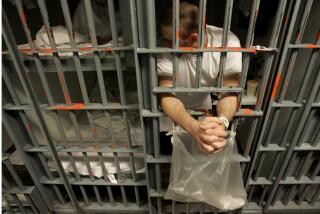First-Time Offenders Caught With Cocaine Will Face Felony Charges : Drugs: The Orange County district attorney’s office says the decision was prompted by former USC quarterback Todd Marinovich’s arrest.
- Share via
SANTA ANA — Reacting in part to the recent arrest of former USC quarterback Todd Marinovich, the Orange County district attorney’s office announced Friday that it will file felony charges instead of misdemeanors against first-time offenders caught with small amounts of cocaine.
In the past, misdemeanor charges were filed if the amount possessed was less than a gram.
Chief Deputy Dist. Atty. Maury Evans said executives in the office have discussed changing the policy for some time, but that the decision was made after Marinovich’s arrest.
“I think it’s fair to say that the Marinovich case heightened our level of awareness that a change might be in order,” Evans said. Dist. Atty. Michael R. Capizzi, who signed an order making the change, was out of the office for the day and unavailable to discuss it.
Marinovich, 21, was arrested on Jan. 20 about 4:15 a.m. by Newport Beach police on a street near his mother’s home on Balboa Peninsula. Police stopped Marinovich and three others, concerned that they might be disrupting the quiet of the neighborhood.
Lab tests on a substance in Marinovich’s possession showed it was less than half a gram of cocaine. He was charged with a misdemeanor under a Business and Professions Code statute, actually designed for prescription drugs.
Under Capizzi’s new ruling, Marinovich would have been charged with a felony. The guideline only affects future cases.
A person convicted of a cocaine misdemeanor can be sentenced to six months in Orange County Jail and fined up to $1,000, or both. In a felony conviction, a defendant could be sentenced to state prison for up to three years.
In practical terms, the policy change is not likely to affect a dramatic number of defendants. Whether felony or misdemeanor, the courts in Orange County have been dismissing first-time possession charges if a defendant agrees to complete an acceptable drug-diversion program. The vast majority of defendants agree to this, and the charges against them are dismissed.
The policy change would affect those found with small amounts who plead guilty and refuse diversion, or those who fail to complete a diversion plan.
Marinovich has pleaded not guilty, but he has not been confronted at a court hearing with a judge’s offer of a diversion alternative.
Deputy Dist. Atty. Carl Armbrust, who heads the narcotics enforcement team at the district attorney’s office, hailed the decision as a positive step in law enforcement.
“Cocaine has grown up to the point it’s out there killing people,” Armbrust said. “You ought to be charged with a felony if you’re caught with the stuff.”
But Assistant Public Defender Michael P. Giannini, when made aware of the district attorney’s new policy, had a different response.
“Oh my! Oh my!” Giannini said. “We should be going in the opposite direction in these small-time cases. They are literally clogging our court system.”
Armbrust said the change would mean very little, if any, new work for the courts, noting that his office has been handling between 1,200 and 1,500 misdemeanor cocaine cases a year. He said more than twice the number of people are arrested for cocaine possession than for other major illegal drugs, such as heroin.
A Los Angeles Times story after Marinovich’s arrest noted that in Los Angeles County, he would have been charged with a felony or the case dismissed altogether. It also pointed out that in all other counties in the state but Orange, cocaine possession charges are filed under the state’s Health and Safety Code.
Under the new policy--it was signed by Capizzi Wednesday--the use of the Business and Professions Code will be abandoned and all cocaine cases will be handled through the state’s Health and Safety Code.
“We’d gone the other way for years, because these cases were almost always handled through diversion anyway,” Evans said. “But in today’s society, we believe that it should be a felony for someone caught with cocaine.”
Marinovich has announced he will make himself available for the National Football League draft and not return to USC, where his embattled career has included suspension for failure to attend classes.
If he participates in a diversion program, he would attend rehabilitation and family counseling classes for about six months. The charge would then be dismissed if the court concludes he met the diversion requirements.
If Marinovich continues his not guilty plea without going into diversion, his case would go to trial, a rarity in misdemeanor drug cases.
More to Read
Sign up for Essential California
The most important California stories and recommendations in your inbox every morning.
You may occasionally receive promotional content from the Los Angeles Times.










